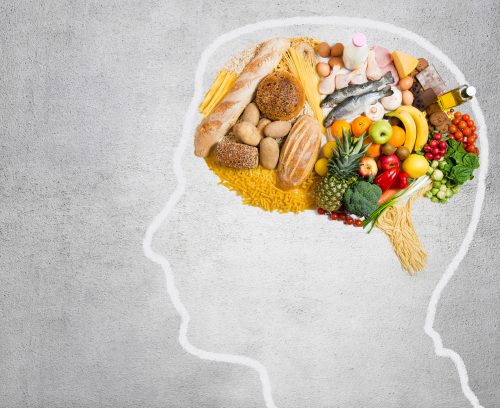
There is now a strong theory that what we eat plays a key part in a range of chronic diseases, including Alzheimer’s. Natalie Filatoff explains.
At the forefront of brain research, connections are being made between high-fat, high-sugar diets, low-level inflammation in the body, insulin malfunction, and Alzheimer’s disease.
The implication is the onset of Alzheimer’s may be stimulated by changes in the human diet which have occurred mainly since the 1970s. For starters, there is the increase in very fatty foods served by fast-food and takeaway outlets (think cheesy pizzas or fat-stacked burgers). There are also more high-sugar and bad-fat combinations in snack foods such as biscuits and cakes.
This high-sugar bad-fat combo also frequently applies to homemade meals with poor nutritional choices such as dishes high in animal fats (eg. more meat than veges, cream and bacon pasta sauces), perhaps served with a sugar-loaded soft drink finished off with ice-cream for dessert.
A new frontier
Garry Egger, Professor of Lifestyle Medicine at Southern Cross University (Australia), has been drawing on worldwide findings and conducting his own research, trying to find a basis for chronic diseases such as heart disease, diabetes, asthma and Alzheimer’s. Pinpointing the root cause of these health issues would be the revolutionary breakthrough to 21st century health and medicine that the germ theory was to curing infectious diseases last century.
Professor Egger is among a posse of experts testing the idea of metaflammation as the cause of these conditions.
“Metaflammation is a form of inflammation,” Professor Egger explains. “It’s the body’s reaction to stimuli with which it is not familiar, such as processed food, a diet high in saturated fats, inactivity, stress, chemicals in the soil, air pollution and so on.”
Although metaflammation is not as severe as the type of inflammatory response you get to bacteria or other infections, it doesn’t go away. These lifestyle triggers keep the body in a permanent state of mild inflammation that is widespread, affecting everything from your heart, to neural tissue, where it can lead to the deterioration of brain function.
The connection with our diet
Coming from a different medical direction, consultant cardiologist Dr Ross Walker’s work with increasing numbers of chronically ill patients has also led him to become a healthy-lifestyle evangelist. He, too, has been drawn to study the connections between what he calls “the rubbish people mistakenly think of as food”, and diseases which manifest in different ways in the body but which have inflammation as a common core.
Alzheimer’s disease, he says, “is just another form of vascular disease [as are heart disease and stroke], but it occurs in the areas of micro-circulation in the brain.”
A build-up of plaques or rogue proteins, known as amyloids, in the brain is known to interfere with neural connections, which is critical to our memory. This build up can be partly caused by, or made worse by poor food choices.
Supporting this is a 2006 Finnish population-based study. It found moderate consumption of saturated fat in mid-life was associated with twice the risk of dementia in later life, while moderate consumption of unsaturated fats (found in avocado and olive oil, fish and other vegetable oils, for example), was associated with reduced risk of later developing dementia by about half.
Unfriendly fats
More recently, scientists have investigated the effect trans fats may have in the body. Dr Walker explains man-made trans fats (used for their thickening effect in cooking and to improve the shelf-life of many packaged foods, such as biscuits) are characterised as hard fats. That is, they solidify at room temperatures. The problem is, trans fats have a similar effect when they enter the body. The membranes of cells are made up of 75 per cent fat, and we need a moderate intake of healthy fats to maintain them.
In a diet that includes a lot of trans fats, however, the cell membranes can become harder and less permeable, making it more difficult for cells to dispose of wastes such as amyloids. As a result, amyloids build up in and around cells, causing them to malfunction. The malfunction triggers inflammation or an immune response in the brain and a kind of traffic snarl occurs blocking brain signals.
Diabetes link
Now, there is also thought to be a connection between amyloid build-up in the brain and the insulin resistance or malfunction, which causes type 2 diabetes. This might go some way towards explaining why people with diabetes are more predisposed than the general population to developing Alzheimer’s.
Dr Walker explains: “The enzyme that breaks down insulin in the body is the same enzyme that breaks down amyloid in the brain.”
So, if it’s busy breaking down insulin to clear excess sugar from your blood, the theory is it doesn’t get around to breaking down the amyloid which, again, continues to build up between the nerve cells in your brain, scrambling the connections that underpin your memory.
Feed your brain
Dr Walker and Professor Egger believe a state of chronic inflammation can be reduced or even reversed by making dietary changes.
While cutting down on saturated fat and sugar can help to reduce inflammation, Dr Walker believes we should also eat a little less in general. This is because eating more than our system can efficiently process can also trigger inflammation.
“Try to shave 30 per cent off what you eat, whether it’s by using smaller plates, not having second helpings or avoiding dessert as a rule,” he says.
Both experts recommend shifting your dietary bias towards a wide variety of vegetables and a little fruit, and getting your protein from fish (which is thought to be brain protective because of its healthy fats), along with protein from nuts, legumes and lean, rather than fatty or processed meat.
There’s more than a hint of the Mediterranean-style diet in all of this, and it’s an eating pattern that’s increasingly being endorsed by health professionals around the world. In fact, a 10-year study found adherence to this kind of diet was associated with a 50 per cent reduction in early death rates. Alzheimer’s New Zealand highlights that some studies (although not all) have shown the Mediterranean diet offers some protection against developing Alzheimer’s disease.
So, can the sum of Alzheimer’s findings be reduced to the dietary prescription of a bowl of brightly-coloured Greek salad with a touch of olive-oil dressing? Not quite, but it’s one meal you can make and enjoy, knowing you’ve made a brain-healthy choice.
Brain swaps
| INSTEAD OF | EAT THIS | WHY? |
| Shredded cheese, bacon bits or mayo | Olive oil-based salad dressing | Keep animal fats out of your salad. Olive oil is thought to be brain protective and also improves your body’s absorption of plant nutrients, including antioxidants. |
| Chops | Fish | Make it your mission to cook, or order, grilled fish at least twice a week. The Framingham Heart Study found people with the highest levels of DHA (an omega-3 fat) were 39 per cent less likely to develop Alzheimer’s. |
| Ice cream | Smoothie | A blend of fruits (banana and anything else in season), low-fat yoghurt, trim milk and a dash of vanilla extract, delivers antioxidants, fibre to help your gut function and protein — but no ‘bad’ fats. |
| Butter | Avocado | On your morning toast or on sandwiches, avocado’s monounsaturated fats (or hummus made with olive oil) are a plus for your brain, whereas butter with saturated fats scores a negative. |
| Adding extra sugar (eg. on porridge) | Toasted sunflower seeds | Vitamin E is also thought to be brain protective, but it must be eaten rather than taken as a supplement. Sunflower seeds are second only to wheat germ as a potent source of vitamin E. |
| White rice | Less rice, more cruciferous vegetables | Whenever you order Asian food, ask for steamed Chinese greens like Chinese broccoli or bok choy. These have high levels of vitamin C and carotenoids which are thought to be brain-protective antioxidants. |
Article sources and references
- Alzheimer’s Association. 2013. Insulin and Alzheimer’s. www.alz. org/research/video/alzheimers_ videos_and_media_insulin.asp Accessed February 2013https://www.alz.org/
- Alzheimer’s New Zealand. www.alzheimers.org.nz Accessed January 2014https://www.alzheimers.org.nz/
- Arya F et al. 2010. Differences in postprandial inflammatory responses to a ‘modern’ v. traditional meat meal: a preliminary study. British Journal of Nutrition 104:724-8https://www.ncbi.nlm.nih.gov/pubmed/20377925
- Laitinen MH. 2006. Fat intake at midlife and risk of dementia and Alzheimer’s disease: A populationbased study. Dementia and Geriatric Cognitive Disorders 22:99-107https://www.ncbi.nlm.nih.gov/pubmed/16710090
- Mayo Foundation for Medical Education and Research. 2010. Diabetes and Alzheimer’s linked. Available at www.mayoclinic.com/ health/diabetes-and-alzheimers/ AZ00050 Accessed January 2014https://www.mayoclinic.org/
- Schaefer EJ et al. 2006. Plasma phosphatidylcholine docosahexaenoic acid content and risk of dementia and Alzheimer disease: The Framingham Heart Study. Archives of Neurology 63:1545-50https://www.ncbi.nlm.nih.gov/pubmed/17101822
- Your Brain Matters. www.yourbrainmatters.org.au/ Accessed January 2014https://yourbrainmatters.org.au/
www.healthyfood.com











